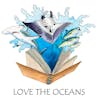Love the Oceans is a non-profit marine conservation organisation working in Guinjata Bay, Mozambique, since 2014. Guinjata Bay, whilst home to a huge host of marine life, has never been studied in depth for any prolonged amount of time. Love The Oceans hopes to protect and study the diverse marine life found here, including many species of sharks, rays and the famous humpback whales. We use research, education and diving to drive action towards a more sustainable future.
Love The Oceans’ mission in Mozambique is to establish a Marine Protected Area in the Inhambane Province, using a bottom-up, community-led approach through research, education and diving.
Love The Oceans is using research and education to achieve our goals. Through research and data collection we’ll be able to build reliable and solid data logs on species caught in fisheries (mainly sharks and rays) and the methods in which they are caught. From this we can conclude the most damaging fishing methods and work towards a more sustainable future with the local fishermen.
LTO collects coral reef data in order to lobby for a marine protected area which could enhance eco-tourism, bringing more money into the region and an alternate income to unsustainable fishing. We strongly believe we’re in a biodiversity hotspot and we need coral reef data to prove our area is worth protecting. We use Reef Life Survey methodology, allowing us to compare our data sets with other reef systems around the world.
We’re collecting the first ever data on the humpback whales in Guinjata Bay, studying their visual behavioural cues, associated surface behaviour, as well as frequency data. With this data we’re hoping to work out why the humpbacks make certain sounds, as well as prove that the frequency of sightings is enough to make this a viable ecotourism driver which could provide a significant amount of income from a renewable resource for the local community. It’s a financial incentive for the government to offer national protection for the area.
Educating the next generation of fishermen in schools about sustainable fishing and why the ocean is important helps the local community protect their biodiversity assets – assets because of ecotourism and fisheries. We’re building bridges with the local communities through our education schemes, teaching marine conservation at two local schools and swimming to the local children, helping to fuel their passion for the marine environment with a view to them one day being able to experience the underwater world for themselves. We have also begun to work with currently active fishermen to educate them on what the future may hold if unsustainable fishing continues.
We have committed to help improve learning facilities at two local schools in our area. We believe in limiting and eliminating dependency so we employ, source and buy locally whenever we can. We are committed to minimising our impact on the local communities and therefore only ask our volunteers to complete tasks that do not take away local jobs, e.g. painting at the schools, and instead employ local construction workers to maintain and build new school buildings using money we have fundraised abroad. The paintings Love The Oceans' volunteers do at the schools are educational murals e.g the human body labelled in Portuguese. With approximately a 50% illiteracy rate in the local community (~75% in women) our volunteers are creating murals the local community have requested and cannot currently create themselves.
By supporting local businesses and providing better facilities for both teachers and students at the local schools we hope to limit and eventually eliminate the dependency on our help. We are currently also working towards securing swim instructor training for Pascal, our in-country representative and translator, to enable Pascal to run swim lessons without our help and outside of Love The Oceans’ field season.
We offer a cutting edge, ethically sound, volunteer program that gives individuals the chance to work along side our marine biologists and the local community, helping with conservation, through research, education and diving over a 2 – 6 week period. Volunteers are essential to our organisation – we simply do not have a big enough team to do all the data collection and educational outreach work we need to do to achieve our goals. This is why we run an ethically sound volunteering program and this is something we’re passionate about. In order to ensure a long-term impact and a significant contribution to our local community we have committed to delivering a continuous and consistent effort, both in our research and our community work, minimizing any possible negative impacts. It is important for us that the work you do with us as a volunteer is meaningful, not just for the project you are working on, but also for you. We can therefore guarantee that however long you decide to join us for, you are always contributing to ongoing projects and directly contributing to the achievement of Love The Oceans’ end goal of establishing a Marine Protected Area.

